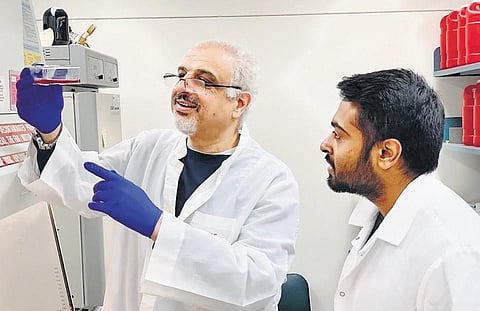

CHENNAI: On the surface, Kalpana Chandrasekar and son Shaswath Sekar are no different from thousands of families across the world — separated by borders and confined to different countries because of the coronavirus-influenced lockdown. While members of other families may have some relief from knowing that their loved ones are safely home, Kalpana does not get that respite.
For miles away from home, in a laboratory in the USA, her son has been toiling away with others like him to develop a vaccine for coronavirus. Here in Chennai, despite the kind of terror that has enveloped the subject, Kalpana has only support to offer her ambitious son. Calls from him are sparse — they have spoken perhaps twice or thrice in the past 10 days; but the entire family has made peace with the new norm. “Whenever he calls, he talks about the progress in his work, how safe he feels at the lab and the necessary measures that are being taken to stay protected. The boy convinced the family with just one line — “If everybody runs away from the problem, then who will fix it?” Of course, his grandparents are worried but we never had the thought of asking him to pack his bags and come home,” shares Kalpana , a physiotherapist.
Lab work in lockdown
Continents away, in Wisconsin, the life of Shaswath is the same as that of any PhD student. He’s currently pursuing his fourth year of the doctorate programme at the University of Wisconsin-Madison. “I’ve worked with infectious viruses such as HIV. We are currently working on a vaccine for COVID-19 and SARS-CoV-2. I’m lucky to work under professor Dr Adel Talaat, who accepted me as his graduate student for my PhD programme as well. We had developed vaccines for Chicken Coronavirus using a patented technology that we aim to translate for SARS-CoV-2.
We are one of the few labs that is still functional, as we fall under the ‘essential employee’ category that works in the times of emerg e n cy, ” e x p l a i n s Shaswath. Shaswath’s day at the lab used to involve multiple projects until he started focusing on the vaccine for COVID-19 and SARS-CoV-2. “My schedule varies every day and I’d spend 8-10 hours at the lab. My work involves infectious diseases in animals. I go to the lab, get my raw materials ready and develop a vaccine based on protocols. Now, I will pursue my existing experiments and not start anything new. The university has also shut down and there are hardly any members in the lab except those who work on the current project,” says Shaswath.
Common man concerns
Despite the essential work, Shaswath — like many of us — does not remain untouched by the consequences of the lockdown. People in Wisconsin have been asked to stay isolated and not step out unless it’s essential. Vaccine dreams aside, Shaswath’s professional life has not been the same in the face of the virus threat; his personal life too has taken a hit. “The place I live has turned into a ghost town. It feels weird to walk in the empty streets. There’s hardly one or two persons out and about in the building where our lab is set up. I’m concerned about my family. I keep sharing as much authentic information as possible on Facebook to educate people about the situation,” he says.
A fight for humanity
Yet, work keeps him going and provides purpose during these bleak times. Multiple labs in different parts of the world are working towards a common goal — to develop a vaccine for coronavirus. Shaswath stays abreast of the advancements in this aspect through bio archives and podcasts by eminent scientists. “Although we’re not under immediate pressure, from a public health perspective, it’s important for us to get the process done faster. The community needs 70 per cent immunity to handle any outbreak in the future. Human trials are going on in different labs but we still haven’t reached that stage. Humanity is at stake. We are actively working from our end,” opens up Shaswath.
JOURNEY TO PHD
A genetic engineering student from SRM University, Chennai, Shaswath moved to the University of
Wisconsin-Madison in his third year around 2014 as part of a semester exchange programme where
he worked under microbiology professor Dr Adel Talaat. During his fourth year, he worked as a research scholar at Baylor College of Medicine, Texas for eight months. After graduating, he worked at the Indian Institute of Science Education and Shaswath with mother Kalpana Research, Mohali for six months.